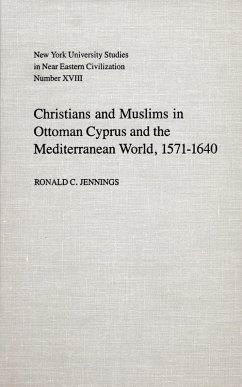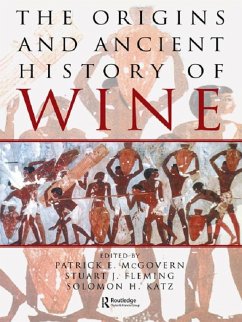
The Legend of COMMANDARIA (eBook, ePUB)
3000 years of winemaking tradition
Versandkostenfrei!
Sofort per Download lieferbar
11,95 €
inkl. MwSt.
Weitere Ausgaben:

PAYBACK Punkte
6 °P sammeln!
Wine tasters typically describe a wine in terms of its bouquet of aromas, mouth characteristics and aftertaste. None of these, however, can catch the sensation felt by a wine lover mindful that the wine in his glass was praised by poets and celebrities through the ages; a wine known to Homer, the author of Iliad and Odyssey, and to Euripides, the 5th century BC Athenian tragedian, who called it Nama, divine inspiration; a wine chosen by the Church Fathers to represent Christ's blood, and praised by King Philip August of France as 'the pope of wines that shone like a star' during the first ever...
Wine tasters typically describe a wine in terms of its bouquet of aromas, mouth characteristics and aftertaste. None of these, however, can catch the sensation felt by a wine lover mindful that the wine in his glass was praised by poets and celebrities through the ages; a wine known to Homer, the author of Iliad and Odyssey, and to Euripides, the 5th century BC Athenian tragedian, who called it Nama, divine inspiration; a wine chosen by the Church Fathers to represent Christ's blood, and praised by King Philip August of France as 'the pope of wines that shone like a star' during the first ever wine contest in 1223 AD.
Previously referred to as the wine of Cyprus, it became widely known during the Middle Ages as the wine of the Commandery of the Knights of St. John, famed all over Europe for its taste, full body and ability to keep 'until the barrel rots'. Tradition has it that St. Gregory believed it surpassed all the wines of this world, and that St. Thomas Aquinas identified it with the 'Botrus Cipri' mentioned in the 'Song of Songs'. During the London 'Feast of the Five Kings' in 1363 AD, Commandaria, as it came to be called, starred as the 'king of the wines and the wine of the kings'; and in 1372 AD, the Curia of Pope Gregory XI of Avignon evidently ordered this divine vinum maroali for his personal use.
¿Over time, foreign travellers and visitors joined in praise of the fine quality of Cypriot wines. Today, Commandaria is an EU protected designation of origin, justifiably claiming to be Europe's first wine denomination. It continues to be 'the fragrant nectar of Zeus', hailed by Constantius of Sinai in 1819, and to 'count among the best wines in the world', as the Frenchman Albert Gaudry reported in 1855.
Previously referred to as the wine of Cyprus, it became widely known during the Middle Ages as the wine of the Commandery of the Knights of St. John, famed all over Europe for its taste, full body and ability to keep 'until the barrel rots'. Tradition has it that St. Gregory believed it surpassed all the wines of this world, and that St. Thomas Aquinas identified it with the 'Botrus Cipri' mentioned in the 'Song of Songs'. During the London 'Feast of the Five Kings' in 1363 AD, Commandaria, as it came to be called, starred as the 'king of the wines and the wine of the kings'; and in 1372 AD, the Curia of Pope Gregory XI of Avignon evidently ordered this divine vinum maroali for his personal use.
¿Over time, foreign travellers and visitors joined in praise of the fine quality of Cypriot wines. Today, Commandaria is an EU protected designation of origin, justifiably claiming to be Europe's first wine denomination. It continues to be 'the fragrant nectar of Zeus', hailed by Constantius of Sinai in 1819, and to 'count among the best wines in the world', as the Frenchman Albert Gaudry reported in 1855.
Dieser Download kann aus rechtlichen Gründen nur mit Rechnungsadresse in A, D ausgeliefert werden.













